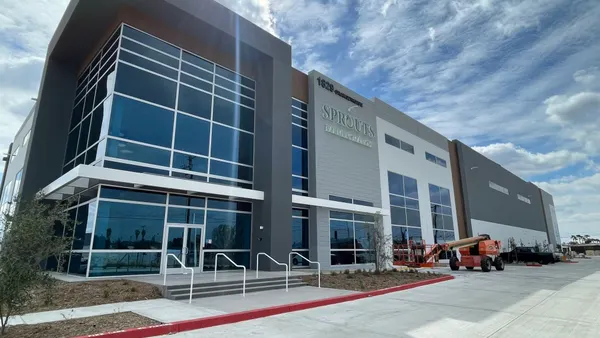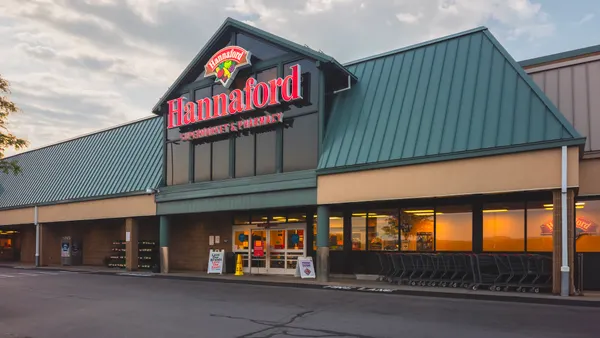Dive Brief:
- A U.S. bankruptcy judge for the Southern District of New York on Wednesday ruled that a lawsuit filed by a litigation trustee for Tops Markets can proceed against private-equity backer Morgan Stanley, which owned Tops for six years.
- The case, which was filed in February 2020, accuses Morgan Stanley of driving the regional grocery store chain into bankruptcy by worsening the grocery company’s debt load while paying substantial dividends to itself and other private equity investors.
- Morgan Stanley had asked the bankruptcy court in New York’s Southern District to dismiss the lawsuit, but the judge ruled against that and is allowing the case to proceed. The plaintiffs are seeking a jury trial.
Dive Insight:
The judge’s ruling on Wednesday means Morgan Stanley must now face accusations that it orchestrated “a series of massive, illegal dividends” that ultimately forced Tops to seek bankruptcy protection.
Morgan Stanley led the private equity group that bought Tops in 2007 for roughly $300 million from Ahold and then sold the supermarket chain to a group of managers from the grocery company in 2013. Morgan Stanley owned more than 70% of Tops and controlled the company and its management during those six years, the suit notes.
The suit alleges that Morgan Stanley knew prior to the acquisition that Tops’ liabilities related to its pension plans jeopardized the company’s financial health. When Ahold refused to agree to terms that would protect Morgan Stanley from legal liability regarding the pension plans, the private equity investors took on the responsibility at a lower purchase price, the suit says.
“Although the Private Equity Investors purchased Tops’ equity for approximately $300 million, they only contributed $100 million of cash towards the purchase price. The remainder of the purchase price, coupled with transaction fees and expenses, came from $227 million of debt issued by Tops,” the suit claims.
The lawsuit claims Morgan Stanley raked up Tops’ debt, primarily due to millions of dollars in “lavish” dividends paid out to the financial firm and other private equity investors, as the grocery company faced its unfunded pension liabilities.
“In total, Morgan Stanley directed the Company to pay out over $375 million total in four dividends, with Morgan Stanley receiving over $270 million. … As a result of these illegal dividends, the Private Equity Investors realized a return of over three times their investment in Tops,” according to the complaint.
The deficit in the company’s pension fund contributions rose from $85 million in 2007 to more than $515 million by May 2013, the suit notes.
At the time of the 2013 sale, Tops’ debt was nearly $650 million — nearly triple the $227 million debt it had in 2007, the lawsuit claims. Tops filed for Chapter 11 bankruptcy protection in early 2018.
“Morgan Stanley dominated and controlled Tops and treated it like a piggy bank for the Private Equity Investors by loading it up with debt to issue dividends, while doing little to maintain Tops and its stores,” the suit alleges.
Along with Morgan Stanley, the lawsuit lists nearly a dozen other defendants, including five people who were on Tops’ board of directors, including the then-chairman, when the dividends were approved and paid out.
Alan Halperin, the trustee for the litigation trust created in the 2018 bankruptcy plan, filed the lawsuit against Morgan Stanley on behalf of creditors, including workers and retirees under the pension plans, according to The Wall Street Journal. The case was filed with the judge who oversaw Tops’ bankruptcy, The Wall Street Journal noted. The suit seeks to hold the private equity owners accountable and to recoup money for Tops creditors.
“We are happy with the decision and look forward to prosecuting the case for the benefit of the creditors of Tops,” Kyle Lonergan, a principal at trial firm McKool Smith and lead counsel for the plaintiffs in the case, said in an emailed statement.
The law firm representing Morgan Stanley did not return a request for comment on the ruling.
Morgan Stanley has faced scrutiny over its ownership of Tops before. When Tops filed for Chapter 11, court papers at the time claimed that the financial firm played a role in the grocery chain amassing an “unsustainable” amount of debt while under the firm’s ownership.












